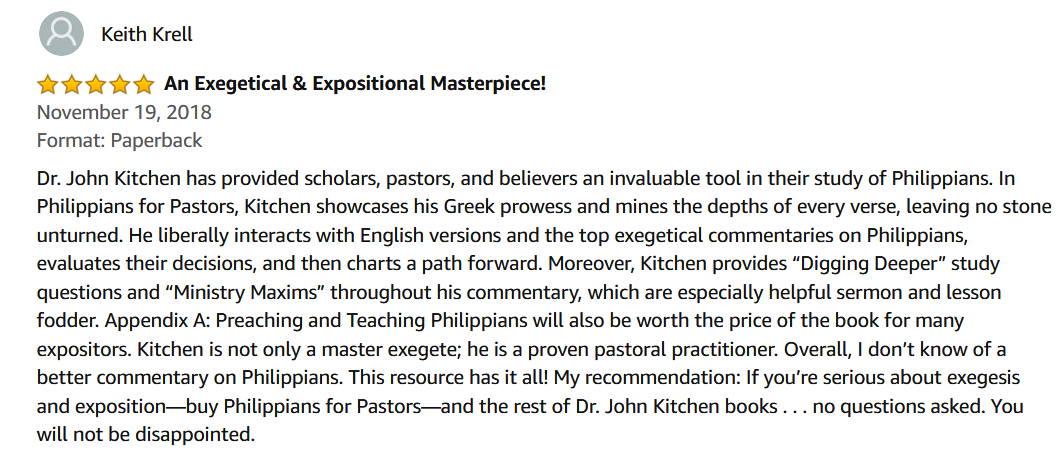Month: November 2018 (Page 1 of 2)
Dr. Charles Savelle, Professor of Biblical Exposition at Southwestern Baptist Theological Seminary, has just done me a great kindness by including some affirmation of my three New Testament commentaries here.  You will want to check out his excellent webpage filled with all kinds of help for expositors of God’s word: www.bibleexposition.net.
You will want to check out his excellent webpage filled with all kinds of help for expositors of God’s word: www.bibleexposition.net.
You may already know that …
Philippians for Pastors was just released by Kress Biblical Resources. It is the third volume in my “… for Pastors” New Testament Bible commentaries. You can get any one of the three for 45% off retail and free shipping (for orders over $20) at the publisher’s website: www.kressbiblical.com. They are also available at Amazon.com and Christianbook.com as well as other online retailers.
You don’t yet know that …
God has opened the door for the publication of two other books.
I’ve just signed a contract for He is Able! with JourneyForth Press. It should be released sometime in 2019.
Also, Cruciform Press has committed to publishing Chosen People, my first foray into the realm of fiction. Watch for its release sometime in the first half of 2019.
I look forward to sharing more about these new books in the coming days. In the meantime please pray that God would guide the preparation process for He is Able! and Chosen People and that all three books would be greatly used of God?
And finally an update on the Arabic translation of Proverbs: A Mentor Commentary. The translation was completed some months ago. The text is now being formatted and laid out before it heads to the printers. Please be in prayer for those undertaking this extensive work. And, of course, pray that God would use this greatly across the Arabic speaking world.
(this is the final post in this series, see parts 1-5 for the fuller context)
Finally, the logical. Let me simply point out that it seems to be a false dichotomy to pit expository preaching and training/equipping people to feed themselves on the Word of God over against one another. The one does not necessarily exclude the other (i.e., if you emphasize expository preaching you aren’t training people to feed themselves on the Word of God). In fact, while expository preaching may not necessarily drive people to their Bibles to feed themselves, it is hard to imagine a people truly equipped to feed themselves on the Word of God who did not desire the corporate experience of doing that very thing together as a people. It is kind of like saying, “I trained my teenager to cook so that he will be independent and live on his own. For that reason we no longer eat family meals together.” The one doesn’t lead to the other. In fact, our family has found it does quite the opposite – we enjoy our times of eating together even more now that our kids have grown and learned to fend for themselves in the kitchen. But then, maybe that’s just because of our last name.
So, ________, thanks again for your email. Sorry this has gone on this long, but I’ve tried to respond to what I heard you asking/saying in as succinct and yet thorough way as I know how.
Richest blessings on you, my brother!
(see parts 1-4 in this series for the fuller context)
Then I’ll point to just one more passage: 2 Timothy 3:14-4:2. Again, check my commentary on the Pastoral Epistles for the detailed exegetical data and a fuller development of the implications (pp.417-434). The simple point, however, is that the chapter division here often blinds us to the continuity of Paul’s intent. He demands that Timothy “preach the word” (4:2; aorist imperative – undertake the action immediately and with urgency).
Paul adds to this four statements which develop just what Paul means by “preach” … “reprove, rebuke, and exhort, with complete patience and teaching.” What we need to notice is that Paul is not speaking randomly about what he wants preaching to be. He is laying out what preaching is because he has just laid out why Scripture itself was given (3:16-17). The Scriptures control the preaching.
Scripture was giving for … (3:16-17)
- “teaching”
- “reproof”
- “correction”
- “training”
The pastor is to … (4:1-2)
- “preach”
- “reprove”
- “rebuke”
- “exhort”
It appears obvious that the latter (preaching) grows out of the former (Scripture). Or to put it another way, the logical outflow of the nature of Scripture itself and the reason for God giving it to us is that it ought to be taken up and “preached” to achieve those purposes among God’s gathered people. God’s purposes for the Scriptures (3:16-17) and for preaching (4:1-2) are one and the same. Preaching should allow the Word of God to dominate and arrive at its intended purpose. A sermon must be more than Scritpure-based, it must be shaped and controlled by Scripture. We must allow our bibliology to inform and control our homiletics. Again, you’ll want to see the commentary for more development of these matters.
Before closing I would like to ask a couple of questions that go to the implications of our theology and the logic of the concerns.
First, the theological. Our doctrinal statement says we believe: “The Old and New Testaments, inerrant as originally given, were verbally inspired by God and are a complete revelation of His will for the salvation of men. They constitute the divine and only rule of Christian faith and practice.”
My question is, if we believe this to be true, when do we as “a people” functionally and regularly come together to submit ourselves to God’s Word as our final authority, to listen to His voice, to respond to His voice?
We are not just persons (who do indeed need to learn to feed ourselves on the Word of God), but we are a people … we have a corporate identity and experience and responsibility. We do need to teach each one (as a person) to feed on God’s Word, but as “a people” we need regularly the collective experience of feeding together on God’s Word through its teaching/preaching … and our affirmation of it through response to the voice of God that comes to us through it.
Where do we corporately affirm our submission to the word of God? If not in the regular, worshipful discipline of preaching, where?

